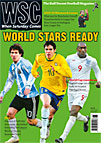 Footballers are increasingly viewed by extremes in the press. James Calder worries that we have become too quick to judge
Footballers are increasingly viewed by extremes in the press. James Calder worries that we have become too quick to judge
I haven’t heard much about Titus Bramble lately. I can’t say I’ve followed his career assiduously but I’m definitely hearing less about him than I used to. Time was when he seemed to be everywhere – pranging cars, giving away soft goals and attracting cheap gags from anyone with an opinion on the game. Once the epitome of “comedy defending”, the term of choice for caustically humorous bloggers and writers everywhere, Bramble seems to have slipped out of the public eye. Well, out of my eye anyway.
But there he is, still playing for Wigan in the Premier League. Last season he collected five separate player of the year awards for the Latics and at the start of this he was described by manager Roberto Martínez as being in the best form of his 11-year career. All of which probably explains why I haven’t heard much about him lately or why the word “Bramblesque” seems to have fallen out of use when describing hapless or, I should say, comedy defenders.
To get regular publicity these days it seems players have to fall into one of three categories: overrated, very good or plain rubbish. And in the latter case, just as Bramble once did, they can almost certainly expect plenty of ridicule on Facebook and YouTube, and in fan forums, newspaper columns and those “worst ever” lists that papers like the Daily Mail take a pride in compiling.
Appearing on a Sportsmail roll call of shame must be the ultimate indignity for the professional footballer. Not only are you singled out for public humiliation, justified or otherwise, the case behind your inclusion can also be misleading.
Joey Barton owes his place at number 22 in its “50 Worst Ever England International Footballers” to his inability to make much of an impression in a 12-minute substitute appearance against Spain in 2007. “Bereft of ideas in his one international… Bad idea all round,” was the verdict of the anonymous Sportsmail reporter, who also concluded that Steve Bull was worthy of his spot at number 19 for the sin of being called up while playing in the old Third Division.
Sportsmail likes cataloguing bad players and bad people. In the wake of the Thierry Henry handball they even brought us “The Top Ten Worst Frenchmen Ever”. Sister lists include “The Worst January Transfer Window Signings Ever”, comprising Hull’s Jimmy Bullard and “The Ten Worst Premier League Strikers Ever”, which features the likes of David Bellion, Francis Jeffers and Sergei Rebrov, all of them regular fixtures on similarly hackneyed rolls of dishonour swilling around on the internet.
The Daily Mail is far from the only offender in this gleeful celebration of failure and misfortune. Adopting an equally judgmental tone, a Telegraph columnist selected Fabio (sic) Coloccini as one of his five worst signings of last season, likening the big-haired Argentinian to “Sideshow Bob from The Simpsons, but without his defensive nous”. Such comments, bordering on the libellous, are commonplace in the superlative-rich world of modern football punditry and journalism.
In this age of unfettered hyperbole, talented players are now better than ever, while less gifted ones have never been worse. Accordingly, imports like Coloccini are given no time to adjust to their new surroundings, a couple of slipshod displays being all that’s needed to acquire a reputation for slapstick defending. Like Bramble, the Argentinian international has since recaptured his best form, though he can expect greater attention when Newcastle return to the top flight next season.
Scrutiny comes from a proliferation of media outlets, all competing for more hits, viewers and sales, with the internet blurring the lines that once separated the experts and analysts from the fans. No longer seeing their brief as merely to inform or even to criticise, an increasing number of writers and pundits now seek to entertain, to be one of the lads and, above all, to avoid being bland. And if not being bland means upsetting the sensibilities of a few overpaid footballers, then so be it. Should anyone take offence, you can always pass it off as banter.
The people in the know will argue that wealthy players can handle the darts and brickbats. But when you read that Bramble’s self-confidence was once so fragile that he used to watch Match of the Day with the volume down and that his mother was often on the point of tears, it becomes clear that money doesn’t buy you a thick skin. I’m just pleased to see the former butt of everyone’s jokes doing well for himself and kept out of the media mainstream. I bet he is too.
From WSC 280 June 2010